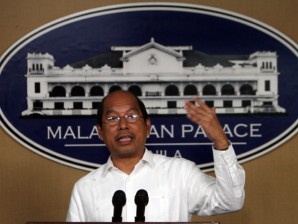The Aquino administration has tightened the release of pork barrel to senators and representatives to stem its misuse especially in the run-up to the campaign in next year’s midterm elections, according to the Department of Budget.
The pork barrel, called the Priority Development Assistance Fund (PDAF), provides funding for the pet projects of congressmen and senators. It has been known to be a source of enrichment for certain legislators who receive kickbacks from private contractors handling their projects.
Budget Secretary Florencio “Butch” Abad Jr. said the administration had “fine-tuned” the list of eligible projects for the P24.89-billion PDAF allocation this year and the release process as part of efforts to prevent abuses in the use of the pork barrel.
“The House of Representatives and the Department of Budget and Management have agreed that only one realignment will be allowed. We foresee a lot of requests for changes as we approach [the] 2013 elections with expected political alignments and realignments taking place,” said Abad in a text message. [A PADF allocation is realigned when its use is changed.]
The release of the pork barrel has been delayed because of requests by senators and representatives to change the projects they had submitted for funding “sometimes even after the special allotment release order (Saro) has already been issued,” Abad said.
A Saro is released by the DBM to advise lawmakers that funds have been allocated for their PDAF and public works funds.
A senator is entitled to P200 million and a member of the House is allocated P70 million in PDAF yearly.
Same implementing unit
In a DBM order issued early this year, the secretaries of education, health, social welfare, interior and local government, environment and natural resources, energy, and public works and highways have been allowed to approve the realignment as long as infrastructure projects fall under the same implementing unit and category as the original purpose.
The DBM has even deleted the provision allowing lawmakers to use up to 10 percent of their PDAF as quick-response fund (QRF) for relief operations in calamity areas.
Lawmakers were previously allowed to realign the unused balance of the QRF at the end of each year for other projects.
Abad said another major cause of delay in the processing of the PDAF was the “failure of processed projects to stay within the menu of eligible projects listed in the GAA (General Appropriations Act).”
Prescreening
To ensure strict compliance, especially by the House, the budget secretary said he had asked the committee on appropriations, chaired by Cavite Representative Joseph E.A. Abaya, to “pre-screen” all submissions before the DBM started the approval process.
Abad said this was aimed at avoiding delays. Both Abad and Abaya are top officials of the ruling Liberal Party.
Stricter
ACT Teachers party-list Representative Antonio Tinio acknowledged that the processing of PDAF had become stricter under the Aquino administration, especially this year.
Tinio said that under DBM guidelines, projects submitted by lawmakers for pork barrel funding should conform with a priority list or standard design prepared by implementing agencies.
He said the DBM also had given priority to fourth-to sixth-class municipalities and the poor identified by the national household targeting system of the Department of Social Welfare and Development.
Iloilo Representative Janette Garin said the new PDAF rules were affecting both administration and opposition members in the House.
“The DBM wants us to give more details, not only what projects are to be funded and who the beneficiaries are, but also a specific program with objectives,” said Garin.
Scope, equipment
Instead of just indicating the location and cost of projects for construction, lawmakers are now required to show the scope of work and type of equipment to be used.
For housing projects, lawmakers should indicate the number of units to be built and produce a certification “that there is an existing site or lot for the housing construction.”
For electrification projects, lawmakers must report the name of the recipient local government unit and obtain a certification from the National Electrification Administration that a target barangay was on its priority list.
Engine displacement
For the purchase of fire trucks, multi-cabs and vans for prisoners, lawmakers should indicate the type of vehicle to be purchased, its engine displacement, the number of units and the names of the recipients.
For health and education projects, members of Congress are required to list down the number of their scholars and health beneficiaries as well as the name of schools and hospitals.
But Tinio remained skeptical whether these reforms would achieve their desired effects.
Patronage politics
“It may be an incremental improvement over previous practices but it does not fundamentally change the nature of the PDAF or pork barrel as the basis for patronage politics at the ground level,” he said.
Tinio added that the PDAF was still the executive’s main instrument for influencing the legislature.
He said the changes did not eliminate opportunities for corruption.
In 2011, the government released a total of P19.305 billion in PDAF of which P17.563 billion went to members of the House.
As of April 8, the DBM had released P1.965 billion worth of pork barrel of which P949.543 million went to House members.
